by Lois Tverberg
But Zipporah took a flint knife, cut off her son’s foreskin and touched [Moses’] feet with it. “Surely you are a bridegroom of blood to me,” she said. So the LORD let him alone. (At that time she said “bridegroom of blood,” referring to circumcision.) – Exodus 4:25-26
One of the strangest stories in the Bible is when Moses and his wife and son return to Egypt after God told Moses to tell Pharaoh to let his people go. The original Hebrew text is difficult to interpret, and it is not clear whether Moses’ life or his son’s life was in danger, and who was touched with the blood. Commentators believe that this may have been part of a longer story handed down orally that the ancient audience was assumed to know.
A few keys can help us see the point of the story, though. Circumcision was the sign of the covenant that God had made with Abraham, the visible mark of the commitment between the people of Israel and God. God seems to require this sign before fulfilling covenantal promises. With Abraham, even though God appeared to him years before he was called to circumcise his family, it was only after he did so that Sarah became pregnant with Isaac, the promised son. Similarly, God had called Moses at the bush, but now before God can use him to fulfill his covenant, he must come under the covenant himself.
A new understanding of the word translated “bridegroom” also clarifies the passage. In Hebrew, the word hatan commonly means “bridegroom.” But in Akkadian and Arabic, two closely-related languages to Hebrew, the word means “protected” or “circumcised.” This passage may have been using a less common definition of hatan, so Zipporah would have said “You are protected by blood,” instead of “a bridegroom of blood.” (1)
The surrounding text also gives some insight. Immediately before this story are the words that God gave Moses for Pharaoh: “Israel is my firstborn son, and I told you, ‘Let my son go, so he may worship me.’ But you refused to let him go; so I will kill your firstborn son.” (Ex. 4:22-23) This is a prophecy of the coming of the plague of the death of the firstborn that will allow the Israelites to go free. The Israelites were protected from judgment by the blood of the lamb daubed on their doorposts. This story seems to be a foreshadowing of that event, showing that Moses’ own son was protected by blood as well. The word for “touched” is the same as that used for daubing the blood of the lambs on the doorposts, suggesting that this is the case.
All this points to the idea that in ancient ways of thinking, God was communicating that salvation from judgment only comes from being protected by blood. Through this strange story, we can see into the future, to the need for the shedding of the blood of Jesus as well.
(1) Sarna, N., The JPS Torah Commentary on Exodus, Jewish Publication Society, 1991, p. 26.

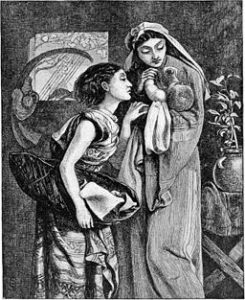 In the first few chapters of Exodus, women play a major role. Pharaoh tells the midwives Shiprah and Puah to kill the newborn boys but let the girls live. His assumption was that while men posed a threat, women would be easily assimilated into Egyptian culture and exploited as domestic and sexual slaves. We also see hints of this in Abraham’s time, when he tells Sarah that the Egyptians would kill him and take her. (Genesis 12:12)
In the first few chapters of Exodus, women play a major role. Pharaoh tells the midwives Shiprah and Puah to kill the newborn boys but let the girls live. His assumption was that while men posed a threat, women would be easily assimilated into Egyptian culture and exploited as domestic and sexual slaves. We also see hints of this in Abraham’s time, when he tells Sarah that the Egyptians would kill him and take her. (Genesis 12:12)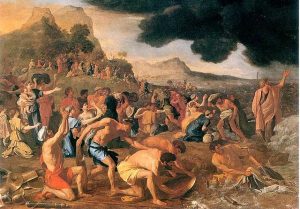
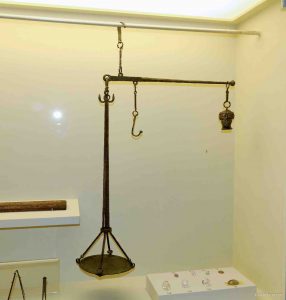 The rabbis pointed out that this pattern of the punishment fitting the crime is a recurring theme throughout the Scriptures. Because Jacob deceived Isaac in his blindness into giving him the birthright, Jacob is fooled into marrying Leah when he is “blind” – when she is brought to him veiled, and in the night he doesn’t see his new wife. Or, because Pharaoh killed the Israelite boys by drowning them in the river, God defeated his army by drowning them too. Haman was hanged on the gallows that he prepared for Mordechai. The rabbis called this pattern “measure for measure” – midah keneged midah.
The rabbis pointed out that this pattern of the punishment fitting the crime is a recurring theme throughout the Scriptures. Because Jacob deceived Isaac in his blindness into giving him the birthright, Jacob is fooled into marrying Leah when he is “blind” – when she is brought to him veiled, and in the night he doesn’t see his new wife. Or, because Pharaoh killed the Israelite boys by drowning them in the river, God defeated his army by drowning them too. Haman was hanged on the gallows that he prepared for Mordechai. The rabbis called this pattern “measure for measure” – midah keneged midah.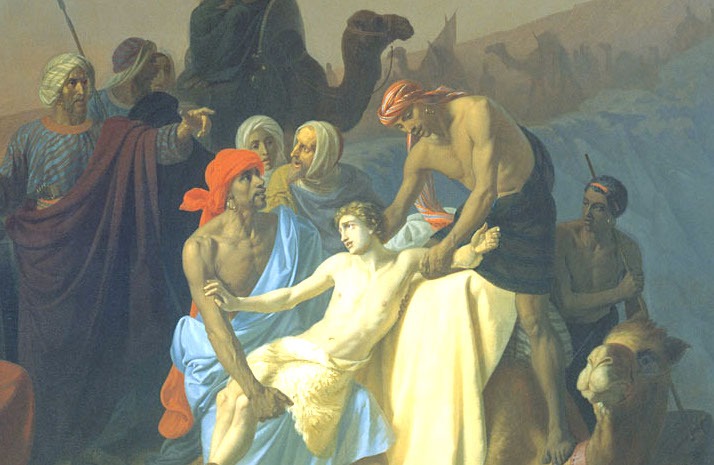
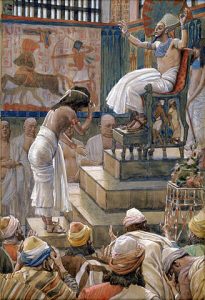 An interesting thing to note was that it seems that even though Joseph had great power in Egypt, he was still a slave even then and not free to leave. In the passage above, when Joseph wanted to travel to Canaan to bury his father, he had to ask permission. Scholars believe that the officials, chariots and horsemen who went with him were there partly to honor Jacob, but also to guard Joseph to make sure that he returned to Egypt.
An interesting thing to note was that it seems that even though Joseph had great power in Egypt, he was still a slave even then and not free to leave. In the passage above, when Joseph wanted to travel to Canaan to bury his father, he had to ask permission. Scholars believe that the officials, chariots and horsemen who went with him were there partly to honor Jacob, but also to guard Joseph to make sure that he returned to Egypt.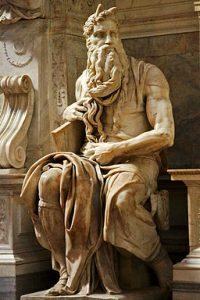 The story of the exodus from Egypt was a defining event in the life of Israel, when God heard their cries and saved them from their enemies. In Jesus’ time, it took on a heightened significance because the people were suffering under severe oppression of a foreign government, and they saw themselves as reliving the afflictions of Egypt. They prayed for a Messiah to come as a second Moses who would free them from bondage to the pagan ruler, just as he did before.
The story of the exodus from Egypt was a defining event in the life of Israel, when God heard their cries and saved them from their enemies. In Jesus’ time, it took on a heightened significance because the people were suffering under severe oppression of a foreign government, and they saw themselves as reliving the afflictions of Egypt. They prayed for a Messiah to come as a second Moses who would free them from bondage to the pagan ruler, just as he did before.
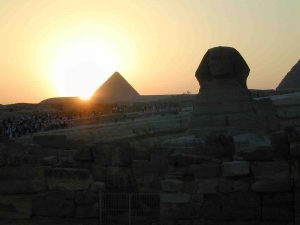 In the next weeks En-Gedi’s Water from the Rock series will focus on Exodus, specifically God’s redemption of the Israelites from Egypt. Christians generally don’t see this story as especially significant. But for thousands of years, Jewish readers have considered it a defining point their history, when God reached down into world events in an unprecedented way. The story of redemption is also central to the rest of the Scriptures, as the foundation of God’s relationship with the people of Israel. We can see the story’s critical importance just by noticing the many references that are made to it throughout the Bible. Here are just a few:
In the next weeks En-Gedi’s Water from the Rock series will focus on Exodus, specifically God’s redemption of the Israelites from Egypt. Christians generally don’t see this story as especially significant. But for thousands of years, Jewish readers have considered it a defining point their history, when God reached down into world events in an unprecedented way. The story of redemption is also central to the rest of the Scriptures, as the foundation of God’s relationship with the people of Israel. We can see the story’s critical importance just by noticing the many references that are made to it throughout the Bible. Here are just a few: